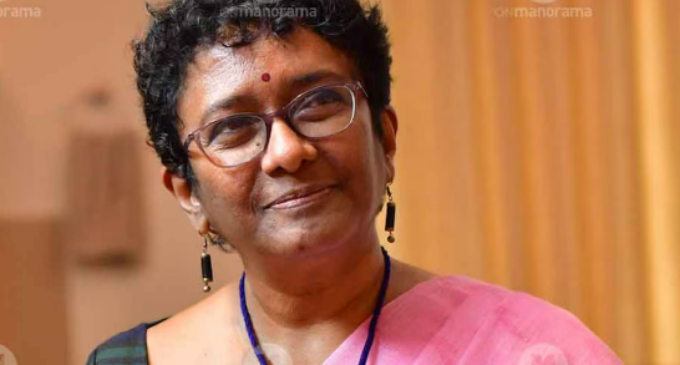‘I need to own my blackness’: Kerala Chief Secretary Sarada Muraleedharan calls out skin colour bias in style

THIRUVANANTHAPURAM, MAR 26 : Kerala Chief Secretary Sarada Muraleedharan is not someone who would mince words when it comes to calling out deep-rooted colour and gender biases in society.
Her Facebook post on Wednesday, which has sparked debates, is ample evidence for her stand on the said issues.
In her post, she recounted an offhand remark made by a person who compared her tenure to that of her predecessor V Venu, who’s also her husband.
“Heard an interesting comment yesterday on my stewardship as chief secretary -that it is as black as my husband’s was white,” she wrote.
Initially, overwhelmed by responses, she deleted the post. However, she later decided to repost it, believing the issue deserved attention.
“It was about being labelled black (with that quiet subtext of being a woman), as if that were something to be desperately ashamed of,” she wrote.
Even as conversations about self-acceptance and representation are all over the place, the roots of colourism and gender bias remain stubbornly deep. We still live in a world where a woman in power can be reduced to the colour of her skin. Where a child can wish to be ‘born all white and pretty.’ Where success is still painted in shades of fair.
These biases continue, often disguised as casual remarks, sometimes as a conversation starter, phrases like “കറുത്തു പോയല്ലോ” (You’ve darkened) or “കറുത്തതാണെങ്കിലും സൗന്ദര്യം ഉണ്ട്” (She’s beautiful despite being dark).
Sarada Muraleedharan’s post reminds that these offhanded comments shape perceptions in ways that go beyond personal experiences. The comparison between her and Venu was not about policies or governance. It was about skin tone, a factor irrelevant to leadership yet still central to societal judgment.
have lived for over 50 years buried under that narrative of not being a colour that was good enough,” she wrote.
For women in public life, whether bureaucrats, actors, politicians, or professionals, appearance remains an unfair measure of worth. A man is seen as firm, while a woman is labelled cold. A man is a leader, a woman is bossy. A man is measured by his actions, a woman by her appearance, tone, and demeanour.
Sarada Muraleedharan recalled how, at the age of four, she once asked her mother if she could be “put back in the womb and brought out again, all white and pretty.” It was a personal yet universal reflection of how colour bias dictates beauty standards, self-worth and even professional credibility.
Society’s obsession with these stigma is evident everywhere. From fairness creams and photo filters to matrimonial ads still seeking “wheatish” or “fair” brides to overlooking budget over Nirmala Sitharaman’s sarees.
These associations go beyond skin tone. They creep into our judgments of character, leadership, and credibility. A fair-skinned leader is seen as authoritative. A dark-skinned one, as aggressive. A fair-skinned woman is elegant and dark-skinned woman, too bold.
Yet, Sarada Muraleedharan’s post does not end in despair but in reclamation. It ends in confidence. Unlike Sarada, her children did not grow up burdened by the idea that black was something to fix or hide, she wrote. “They gloried in their black heritage,”. They found beauty where she had been conditioned to see none. They showed her what she had been unable to see for decades and wrote:
“That black is beautiful. That black is gorgeousness. That I dig black.”
Meanwhile, many have come up expressing their solidarity. From senior CPM leader PK Sreemathy to Opposition Leader VD Satheesan.
“Salute, dear Sarada Muraleedharan. Every word you have written is heart-touching. It deserves to be discussed. I had a mother whose skin colour was black,” wrote V D Satheesan.
-PTI






